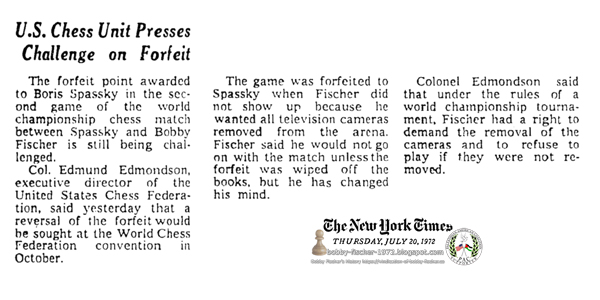What Moscow wanted us to believe … vs what REALLY happened (in Fischer's own words).
FACT CHECK: November 08, 1972 Johnny Carson Interviews Bobby Fischer (8:43/18:30)
CARSON: Now what about the cameras over there Bob? Now you hear about all this about you'd agreed they could film this, and then you kept changing the camera man was Vladivostok someplace, or …
[laughter]
What was the real story?
FISCHER: I was more disappointed than anybody that this thing wasn't televised because, you know, there was a lot of publicity and a lot of money involved and I wanted the people to see me in action. Let's face it. But they had these characters there, who instead of having, some kind of video tape film that didn't make any noise, just, nobody around to operate them, just sort of stationless and they just had guys there with film cameras that were worrying, and they were all around me. Making a racket. A nuisance.
CARSON: Too much noise.
FISCHER: Too much noise, and visually you could see them moving around.
The Deception Broadcast Throughout 1972 American Newspapers:
The Akron Beacon Journal Akron, Ohio Sunday, July 16, 1972
“Meanwhile, Fox and his lawyers engaged a sound engineer to test the hall and report on * how much noise the cameras actually were making. The answer: No noise at all.
The report said the noise level was 55 decibels without the cameras in action, and exactly the same 55 decibels with the cameras working. The cameras, hidden in a ventilator shaft, are invisible except for the lenses at a four inch aperture.”
Did Chester Fox Inc. have that decibel-test performed on all of the disruptive MEN... the circus, operating the cameras?!
 Cameras in Playing Hall Sun, Jul 16, 1972 – Page 5 · The Akron Beacon Journal (Akron, Ohio) · Newspapers.com
Cameras in Playing Hall Sun, Jul 16, 1972 – Page 5 · The Akron Beacon Journal (Akron, Ohio) · Newspapers.com
In his letter, he asserted: “The bungling unknowns who claimed to be professional cameramen were clumsy, rude and deceitful. The only thing invisible, silent and out of sight was the fairness on the part of the organizers.
“I have never compromised on anything affecting playing conditions of the game itself, which is my art and my profession.
“It seemed to me that the organizers deliberately tried to upset and provoke me by the way they coddled and kowtowed to that camera crew.
“I am keen to play this match, and I hope game two will be scheduled for Sunday, July 16 at 5 in the afternoon.”
Fischer declared that when all the camera equipment had been removed “I will be at the chessboard.”

 Robert Fischer Boycotts Second Match in Protest Against Men Hired to Disruptively Operate Cameras 15 Jul 1972, Sat Star Tribune (Minneapolis, Minnesota) Newspapers.com
Robert Fischer Boycotts Second Match in Protest Against Men Hired to Disruptively Operate Cameras 15 Jul 1972, Sat Star Tribune (Minneapolis, Minnesota) Newspapers.com
“Be as noisy as possible. If Fischer refuses our camera (men and their loud shuffling and noise), then we sue for 3.3 million. Capitalism is wonderful.”
— Soviet Chess Federation in Moscow to Chester Fox, 1972
* those cameras didn't operate themselves, you know?
(16:59/18:30)
CARSON: What drove you? What REALLY drove you? Was it because you kind of felt the Russians were kind of playing games for awhile and wouldn't let the championship out of their country?
FISCHER: Well, at first it was just the love of the game as a boy. Loving to win and all. And I had all this trouble with the Russians and they tried to block me from playing them for a title match and all this, and they kept writing I wasn't that good, I wasn't even in the top ten they said, I wasn't, you know, I was just a big talker, I just got publicity because of antics and all this. Really, over the board, there was no comparison between me and the Russians.
CARSON: So you had to go prove it, huh?
FISCHER: Well... this is really what kept me on. If they had just shut up, and ignored me and uh, you know and said I was a very fine player, I might not have gone for the title. It didn't matter to me that much. I knew I was the best. But they kept saying this ALL THE TIME. Putting me down. Got me mad.
CARSON: They sure did.
New York Times, New York, New York, Thursday, July 20, 1972 - Page 30
U.S. Chess Unit Presses Challenge on Forfeit
The forfeit point awarded to Boris Spassky in the second game of the world championship chess match between Spassky and Bobby Fischer is still being challenged.
Col. Edmund Edmondson, executive director of the United States Chess Federation, said yesterday that a reversal of the forfeit would be sought at the World Chess Federation convention in October.
The game was forfeited to Spassky when Fischer did not show up because he wanted all ([disruptive men hired to disruptively operate]) television cameras removed from the arena. Fischer said he would not go on with the match unless the forfeit was wiped off the books, but he has changed his mind. ([Not exactly changed his mind. The match was moved to an external room that contained automated closed-circuit cameras which Fischer never had objections to, and further, the aforementioned resolution was promised by the President of the USCF, Dubeck, to challenge the forfeit, if in the event that single point could adversely determine the outcome of the match.])
Colonel Edmondson said that under the rules of a world championship tournament, Fischer had a right to demand the removal of the cameras and to refuse to play if they were not removed.























